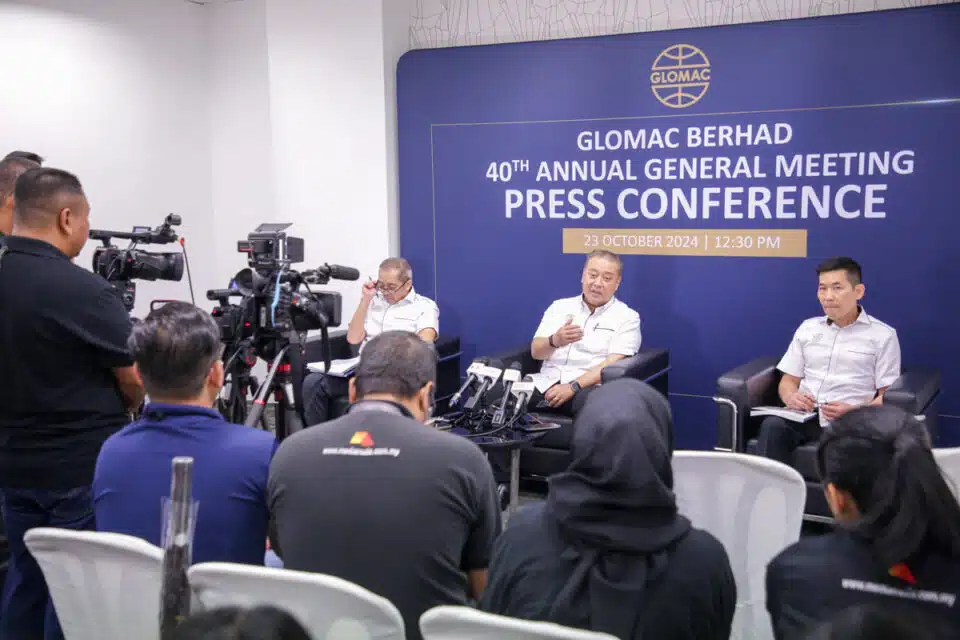
KUALA LUMPUR, Oct 24 — Glomac Bhd is aiming to boost property sales with a robust lineup of new offerings, planning to launch nearly RM460 million worth of residential and commercial properties in the financial year 2025 (FY2025).
Among others, the award-winning property developer, with projects across Greater Kuala Lumpur, Selangor, and Johor, plans to launch new phases of double-storey houses in its established township developments, including Serai@SBCR in Sungai Buloh, Saujana KLIA, and Saujana Jaya in Kulai, Johor.
According to its group managing director and chief executive officer, Datuk Seri Fateh Iskandar Mohamed Mansor, Glomac shareholders have also approved the final single-tier dividend of 1.25 sen per ordinary share for the financial year ended April 30, 2024.
“Glomac has been listed since 2000, and we have generated profit every year. Even during the 2021 Covid-19 period, when profit decreased, we still remained profitable and paid dividends. Since our listing, we have consistently maintained a track record of paying dividends,” he said at the Glomac annual general assembly press conference at Menara Glomac, here yesterday.
With a strong balance sheet, substantial capital reserves and a strategically located landbank with an estimated gross development value (GDV) of RM7 billion, Iskandar said Glomac is poised for continued growth in the coming years.
The company also today announced a Sukuk Wakalah Programme with a cap of up to RM3 billion.
The proceeds will be used for land acquisitions, working capital, refinancing existing Shariah-compliant borrowings, and exploring business areas that align with the group’s core operations.
The company is currently working to meet the necessary conditions for the first issuance, which will be up to RM250 million under this programme.
Business diversification
On a separate matter, Iskandar said Glomac is currently in discussions with various parties to explore opportunities in the waste-to-energy sector. However, he said due to the substantial capital investment required, the company remains focused on its primary business of property development.
“So, if there’s anything synergistic related to real estate, we are always interested. While we are primarily a property and real estate company, we also engage in property management, construction, and carpark management, among other activities. Waste-to-energy is something that we are still looking at, but it involves a huge amount of capital.
“We also need to gain the support of the respective local councils because, at the end of the day, waste is collected by them. If they don’t send it to you, you won’t receive it. However, as the Malaysian economy grows, our landfills can’t accommodate waste for much longer.
“How many more landfills are we going to open? One of the ways to eliminate this is waste-to-energy. Yes, we are looking at it, but we are still in the talking stages,” he said.
Minimum wage, EPF contributions for foreign workers
Commenting on plans to make minimum wage and Employees Provident Fund (EPF) contributions mandatory for foreign workers, Iskandar said the initiative is aimed at reducing the government’s financial burden in the long term.
However, he believes employers, particularly those hiring foreign workers, should be given sufficient time to adjust, and suggested a phased implementation by 2026.
“It will certainly impact our construction sites, as we will definitely have some foreign workers. While I understand the long-term demand, in the short term, many employers will face challenges.”
Iskandar explained that in the construction industry, different stages of a project require workers with different skills, such as bricklayers, plasterers, and painters. While they are often employed by the developers and are willing to work for the minimum monthly wage, they also take into account the overall working environment and conditions.
“We are hoping that there is going to be a warning period,” he said, while expressing hope that the government would reconsider its decision to begin implementing the policy starting from next year.
“We are not ready for this. I was hoping for a little bit more time. If they told us it starts in January 2026, then we’ll know what to do.”
In the long term, he suggested alternative solutions to encourage developers and contractors to hire locals and reduce reliance on foreign labour. However, incentives are crucial for this transition, he said.
Affordable housing
Iskandar also commended the Federal government’s allocation of RM900 million for the Programme Residensi Rakyat (PRR) and Rumah Mesra Rakyat housing schemes under Budget 2025 for first-time home buyers but said it would be beneficial to increase the fund.
“From the perspective of private developers, we are prepared to offer our land to the government to construct affordable homes.”
However, he said each time developers fulfil the government obligation to build affordable homes on land they own, they incur financial losses, necessitating cross-subsidies from open-market projects to cover the shortfall.
Despite this challenge, he said private developers are willing to collaborate with the government to support the policy.
Iskandar added that there still is a shortage in affordable housing, with demands only met in areas where there is a significant need.
Last Friday, when tabling Budget 2025, Prime Minister Datuk Seri Anwar Ibrahim announced that almost RM900 million has been allocated for the implementation of 48 PRR and 14 Rumah Mesra Rakyat housing schemes.
Source: Selangor Journel
